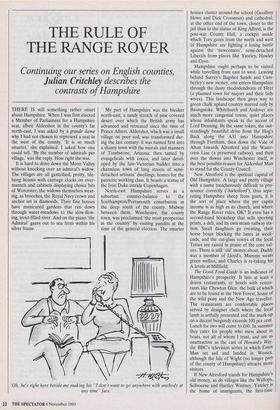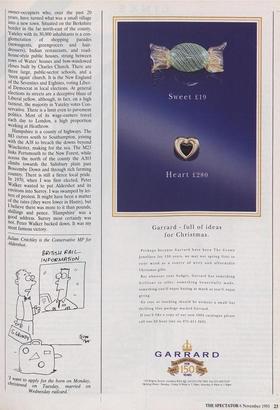THE RULE OF THE RANGE ROVER
Continuing our series on English counties,
Julian Critchley describes the
contrasts of Hampshire
THERE IS still something rather smart about Hampshire. When I was first elected a Member of Parliament for a Hampshire seat, albeit Aldershot in the county's far north-east, I was asked by a grande dame why I had not chosen to represent a seat in the west of the county. 'It is so much smarter,' she explained. I asked how one could tell. 'By the number of admirals per village,' was the reply. How right she was.
It is hard to drive down the Meon Valley without knocking over an admiral's widow. The villages are all gentrified, pretty, tile- hung houses with carriage clocks on over- mantels and cabinets displaying choice bits of Worcester; the widows themselves wear- ing, as brooches, the Royal Navy crown and anchor set in diamonds. Their fine houses have manicured gardens that run down through water-meadows to the slow-flow- ing, trout-filled river. And on the piano 'the Admiral' gazes out to sea from within his silver frame.
My part of Hampshire was the bleaker north-east, a sandy stretch of pine-covered desert over which the British army has advanced and retreated since the time of Prince Albert. Aldershot, which was a small village on poor soil, was transformed dur- ing the last century: it was turned first into a shanty town with the morals and manners of Tombstone, Arizona; then tamed by evangelicals with cocoa, and later devel- oped by the late-Victorian builder into a charmless town of long streets of semi- detached artisans' dwellings, homes for the patriotic working class. It boasts a statue of the Iron Duke astride Copenhagen.
North-east Hampshire serves as a suburban counter-balance to the Southampton/Portsmouth conurbation in the deep south of the county. Midway between them, Winchester, the county town, was proclaimed 'the most prosperous in the country' by visiting pundits at the time of the general election. The smarter
'Oh, he's right here beside me making his "I don't want to go anywhere with anybody at any time" face.' houses cluster around the school (Geoffrey Howe and Dick Crossman) and cathedral; at the other end of the town, closer to the jail than to the statue of King Alfred, is the post-war County Hall, a cockpit inside which Tory gents from the north and west of Hampshire are fighting a losing battle against the 'newcomers', semi-detached Liberals from places like Yateley, Hawley and Cove.
Hampshire ought perhaps to be visited while travelling from east to west. Leaving behind Surrey's Bagshot Sands and Cam- berley's new money, one enters Hampshire through the dusty rhododendrons of Fleet (a planned town for majors and their lady wives). This landscape then gives way to green chalk upland country marred only by Basingstoke. Whitchurch and Andover are much more congenial towns, quiet places whose inhabitants speak in the accent of Lord Denning. By the same token, the out- standingly beautiful drive from the Hog's Back along the A31 into Hampshire through Farnham, then down the Vale of Alton towards Alresford and the Water- cress Line (a preserved railway), and then over the downs into Winchester itself, is the best possible reason for Aldershot Man to stand for the County Council.
New Alresford is the spiritual capital of Old Hampshire. A large and pretty village with a name treacherously difficult to pro- nounce correctly ('Awlesford'), thus sepa- rating Hampshire sheep from goats, it is the sort of place where the per capita income is as high as its church, and where the Range Rover rules, OK? It even has a second-hand bookshop that sells sporting prints, a deli, and its own steam railway sta- tion. Small daughters go eventing, their horse boxes blocking the lanes at week- ends, and the cut-glass voices of the local Tories are raised in praise of the core val- ues. There is still 'old' money about. Daddy was a member of Lloyd's, Mummy wears green wellies, and Charles is re-taking his A levels at Millfield.
The Good Food Guide is an indicator of Hampshire's prosperity. It lists at least a dozen restaurants, or hotels with restau- rants like Chewton Glen, the bulk of which are to be found in the New Forest, home of the wild pony and the New Age traveller. The restaurants are comfortable places served by designer chefs where the local lamb is artfully presented and the mark-up on a decent burgundy exceeds 100 per cent. Lunch for two will come to £60. In summer they cater for people who mess about in boats, not all of whom I trust, and are as unattractive as the cast of Howard's Way, the BBC's television series in which Essex Man set sail and landed in Wessex, although the Isle of Wight (no longer part of the county of Hampshire) attracts more visitors.
If New Alresford stands for Hampshire's old money, as do villages like the Wallops, Selbourne and Hartley Wintney, Yateley is the home of immigrants, the first-time owner-occupiers who, over the past 20 years, have turned what was a small village into a new town. Situated on the Berkshire border in the far north-east of the county, Yateley with its 30,000 inhabitants is a con- glomeration of shopping parades (newsagents, greengrocers and hair- dressers), Indian restaurants, and road- house-style public houses, strung between rows of Wates' houses and bow-windowed closes built by Charles Church. There are three large, public-sector schools, and a 'born again' church. It is the New England of the Seventies and Eighties, voting Liber- al Democrat in local elections. At general elections its streets are a deceptive blaze of Liberal yellow, although, in fact, on a high turnout, the majority in Yateley votes Con- servative. There is a limit even to pavement politics. Most of its wage-earners travel each day to London, a high proportion working at Heathrow.
Hampshire is a county of highways. The M3 curves south to Southampton, joining With the A38 to breach the downs beyond Winchester, making for the sea. The M23 links Portsmouth to the New Forest, while across the north of the county the A303 climbs towards the Salisbury plain past Boscombe Down and through rich farming country. There is still a fierce local pride. In 1970, when I was first elected, Peter Walker wanted to put Aldershot and its environs into Surrey. I was swamped by let- ters of protest. It might have been a matter of the rates (they were lower in Hants), but I believe there was more to it than pounds, shillings and pence. 'Hampshire' was a good address. Surrey most certainly was not. Peter Walker backed down. It was my most famous victory.
Julian Critchley is the Conservative MP for Aldershot.
want to apply for the born on Monday, christened on Tuesday, married on Wednesday railcard.'











































































 Previous page
Previous page